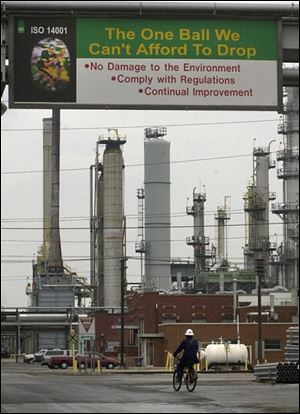
BP refinery under study for upgrade
4/27/2005
The last project to convert the refinery cost $235 million. Also under study for the change to heavy crude is an Indiana plant.
The BP PLC Toledo refinery is being eyed for a major investment to boost its ability to handle cheaper heavy crude oil.
How many millions of dollars might be spent is unclear, but the last project to convert the plant in the Toledo suburb of Oregon to more heavy crude was $235 million. No added capacity or more jobs are expected, however.
John Manzoni, the firm's chief executive for refining and marketing, revealed the proposal in an interview yesterday, according to Bloomberg News Service.
Refineries in the Toledo suburb of Oregon and in Whiting, Ind., are being studied for the investment, which would increase the capacity to produce gasoline and other fuels from sulfur-laden crude, which has averaged $6.43 a barrel less than low-sulfur crude during the past year, according to the report.
While declining to elaborate, the refining chief said BP intends to make a decision in the next six months.
"Even though our engineers are studying a number of projects around the world, we're not in a position to make an announcement about where we might be investing. " said Scott Dean, a BP spokesman in Chicago.
Union representatives at the local refinery, which employs 450 and is BP's smallest U.S. plant, said they have been told that the proposal would shift the operation entirely to heavy crude from 70 percent now.
"That's certainly an option we're looking at," said Mary Caprella, a company spokesman in Toledo. She declined to elaborate.
Representatives of the Paper, Allied-Industrial, Chemical, and Atomic Workers International Union, who represent workers at the refinery, were unsure how large an investment was proposed for Toledo, but said investments for conversion from so-called sweet crude to heavy crude could total $2.3 billion.
BP has already begun an expansion of heavy crude-refining capacity at a plant in Castellon, Spain.
While not discussing the potential size of the investment, the news service report quoted the BP executive as stating that any U.S. upgrade "would be a bigger chunk of investment."
The other U.S. refinery being studied for upgrade is on the Indiana border just outside Chicago. It is among BP's largest U.S. refineries, with a capacity of 420,000 barrels a day.
Employment at the local refinery would not grow significantly because the 155,000-barrel a day refining capacity would not increase, said union representatives who spoke on the condition they weren't identified.
However, they noted that the project would create a significant temporary spike in construction employment locally.
Any spending would be on top of a 10-year, $300 million project started last year at the refinery on the Toledo border to meet upcoming federal regulations for cleaner-burning fuel.
That followed a $235 million investment in the late 1990s that first gave the plant the ability to refine less expensive crude, known as "sour."
As the price of "sweet" crude has soared to over $60 a barrel at times the past year, refineries increasingly have moved to switch to the cheaper oil, which is primarily produced in Canada.
Experts estimate that 60 percent of crude oil being produced and 68 percent of global reserves is heavy crude.
Contact Gary Pakulski at:
gpakulski@theblade.com
or 419-724-6082.